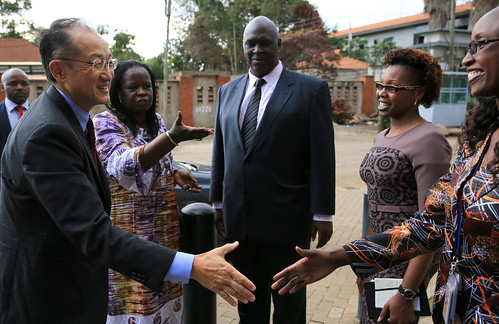美國國會在聖誕節休會前,通過2015年綜合撥款法(Omnibus Appropriations Act),無論是在美國國內或國際上,都受到各環境與社會正義團體的一致肯定。
依照此法,只要世界銀行提出的任何環境人權防衛措施(safeguards)低於目前水準,美國財政部都必須反對。
不利於環境保護 世銀欲刪資助計畫審核機制
2014年7月,世界銀行提出其自行訂定的「環境與社會防衛框架和防衛審查系統」(Environmental and Social Safeguards Framework and the Safeguards Review Process),數個月來引發部分國會成員不滿,甚至受到其他多邊銀行的抨擊。
雖然世界銀行將勞工權益、氣候變遷、無障礙和原住民遷居議題納入新政策,長期以來,世界銀行也致力於保護環境和社會,免受銀行資助計畫副作用的影響;但參議員最關切的是,以往董事會批准貸款必須先審核環境和社會保障,並在撥款後加強環境和社會衝擊的監控,而新政策則將削弱這層保障,也允許各國政府停止維護受其影響的居民權益。
其他多邊銀行也批評世界銀行的新政策草案。亞洲開發銀行獨立評估分部認為,世界銀行的新政策「可能稀釋保護環境和社會的實質作用」,並呼籲「維持將環境社會保護列為審核項目之一的保障系統」。
美政府通過法案 祭出拒絕貸款、禁止入境等規定
透過2015綜合撥款法,國會成功要求美國政府──世界銀行最大金主,在世界銀行或任何世界銀行集團成員縮減其防衛政策時,拒絕提供新貸款或贈款。
「當國際復興開發銀行的貸款、贈款、政策或策略,其相關環境或社會保障低於2014年9月30日之水準,財政部長應指示國際復興開發銀行美國執行董事,拒絕該貸款、贈款、政策或策略。」撥款法案第1199頁寫道。
在反高層貪腐和人權部分,根據新撥款法,「國務卿若掌握可靠情資,顯示外國政府官員或直系親屬涉入重大貪汙,例如自然資源開發或違反人權等情事,應禁止其進入美國。」
新法案也呼籲美國政府,要求國際金融公司(IFC)和其他多邊機構,對於收受公共資金的私人公司,應公開其「受益所有人」身分。
世界銀行已經延長了諮詢期限,增加一輪諮詢,而新一輪諮詢必須將2015年綜合撥款法納入考量。
防衛機制不當 資助反造成更深的傷害
非營利組織「文化生存」(Cultural Survival)舉一世界銀行資助計畫防衛機制不當、造成傷害的例子:
2010年,世界銀行批准35億資金給非洲查德和喀麥隆的石油開發計畫。此計畫將在南查德多巴盆地興建3個油田,每天預計生產225,000桶石油。石油鑽出後,將透過一600吋寬、跨越喀麥隆的管路運送。
此計畫約會影響當地100,000名的俾格米人。管路興建迫使俾格米人隨他們狩獵的動物遷居;俾格米人居住的土地將遭破壞、地下水也會被污染。俾格米人主張,自己並未在計畫開始時被完整告知或諮詢。
參議員警告,世界銀行欲以較薄弱的環境和社會新政策,取代目前的透明監督責任機制,並取消重要的保護措施,因銀行貸款計畫必須遷居的森林依賴社群,將因此受到影響。
Environmental and social justice groups in the United States and around the world are applauding a provision of the 2015 Omnibus Appropriations Act, passed by the U.S. Congress just before the Christmas recess. The measure requires the U.S. Treasury Department to oppose any World Bank policy that provides less protection for the environment or for human rights than the bank’s current safeguards.
For months, the groups, some members of Congress and even another multilateral bank have criticized the World Bank’s July 2014 proposal known as the Environmental and Social Safeguards Framework and the Safeguards Review Process by which it was developed.
Critics say the proposed policy would weaken the World Bank’s longstanding environmental and social protections from harm caused by Bank-funded projects and allow governments to opt out of safeguarding affected indigenous peoples.
By passing the 2015 Omnibus Appropriations Act, Congress is requiring the United States, the World Bank’s largest contributor, to vote against any new loans or grants if the World Bank or any member of the World Bank Group weakens its safeguard policies.
“The Secretary of the Treasury shall instruct the United States Executive Director of the International Bank for Reconstruction and Development to vote against any loan, grant, policy or strategy if such institution has adopted and is implementing any social or environmental safeguard relevant to such loan, grant, policy or strategy that provides less protection than World Bank safeguards in effect on September 30, 2014,” the Appropriations Bill states on page 1199.
In the Anti-Kleptocracy and Human Rights section, the new budget law states, “Officials of foreign governments and their immediate family members about whom the Secretary of State has credible information have been involved in significant corruption, including corruption related to the extraction of natural resources, or a gross violation of human rights, shall be ineligible for entry into the United States.”
The bill also calls for the United States to seek to require the International Finance Corporation, IFC, and other multilateral institutions to publish the identities of the “beneficial owners” of private companies receiving public funds.
One example of harm caused by a World Bank-funded project with inadequate safeguards comes from the nonprofit group Cultural Survival.
In 2010, the World Bank approved funding for a $3.5 billion dollar project enabling oil exploitation in Chad and Cameroon. The project includes the construction of 3 oil fields in the Doba Basin of southern Chad, with oil production estimated at 225,000 barrels per day. Once the oil is extracted, it will be transported through a 600 foot-wide pipe crossing Cameroon, Cultural Survival explains.
Among the consequences of this development are its effects on the roughly 100,000 Bagyeli “Pygmies” who live in the region. Construction of the pipeline will entail forced resettlement as the animals the Bagyeli hunt are driven away, the land they live on is destroyed, and their groundwater is contaminated. The Bagyeli maintain that they were not properly informed or consulted at the project’s outset.
The senators warned that the Bank plans to replace existing environmental and social safeguards with weaker mechanisms for transparency, oversight, and accountability and to eliminate essential protections for biodiversity, forest-dependent peoples and communities displaced by Bank projects.
While applauding the World Bank for adding language on labor fairness, climate change, the rights of persons with disabilities and the displacement of indigenous peoples, the senators’ greatest concern is a new process that moves away from the fulfillment of safegard requirements before Board approval of a loan with increased monitoring of environmental and social impacts after the disbursement of funds.
Even another multilateral bank criticized the World Bank’s draft policy. The Asian Development Bank’s Independent Evaluation Division identified That the proposed draft World Bank “could dilute the strength of social and environmental protections” and called for “continued use of a requirements-based safeguards system.”
The World Bank has extended the consultation period to allow for one more round of consultations, which will have to take the requirements of the 2015 Omnibus Appropriations bill into account.
※ 全文及圖片詳見:ENS








